Using Food for Play is a controversial topic that causes a lot of discussion in Early Childhood Education internationally.
Using food for play (not for consumption) is considered unethical in some countries and cultures. It can be viewed as wasteful and disrespectful.
Have you considered an alternative that is perhaps natural, more sustainable, better for our environment – create less waste and compostable?
In a centre environment, it is important to have these discussions with your families if you plan to use food for play.
Do you know:
How your families feel about using food for play?
If you are upsetting or triggering ANYONE?
1 person/family is enough to review your practice.
As qualified and experienced Early Childhood Educators, we should always work to encompass ‘best practice’.
Best practice happens when we actively reflect on and review our practices, particularly in a cohesive team that is working towards a shared vision.
Reflect on these questions….
What is our WHY?
Why are we using food in play?
What does our philosophy say?
Why are we providing this experience?
Who is it for?
What are the benefits?
What is the cost? – financially and physically (teacher time).
If we use this food item today, what will we use tomorrow?
What is the impact of using this food ? On the environment, children, families, teachers and our community?
Is there an alternative?
Weigh up the pros and cons.
It can be argued that using food for play supports sensory learning….
Often there is a better alternative that similarly supports meaningful sensory learning and stimulation.
When you use actual food such as pasta…. what are you teaching the children? What messages are you giving them?
It is important we go back through our reflective questions in each instance.
Lets talk playdough for example….
Flour, salt, cream of tartar, oil.
Playdough is not gluten free and therefore not suitable for coeliac (unless using an alternative flour, prob more expensive).
The high salt content is not so good for our skin.
It is usually coloured artificially.
When it gets wet, its spoiled.
Takes teacher time to make regularly.
How is it disposed of when its ‘done with’?
What are you going to use tomorrow?
Is there an alternative to playdough? Yes!
CLAY!
Clay is natural, sustainable and accessible – go to your local potter and ask for the clay seconds (cant be fired). Or dig some up in your local area. You can also purchase through teaching side catalogues.
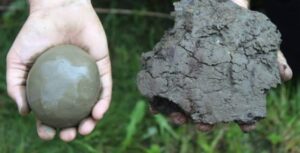
Clay is cheaper than the costs entailed with playdough.
It is easy to clean.
Clay is textile, add water and it’s still good.
It does not use food items!
It is natural, therefore is a sustainable option, (returned to the earth ‘when done’).
Clay promotes connection with nature .
Clay is beautiful work with. It works the hand and finger muscles, it smells earthy, it has a smooth texture and is soothing in its nature.

So tell me, why are you still making and using playdough??
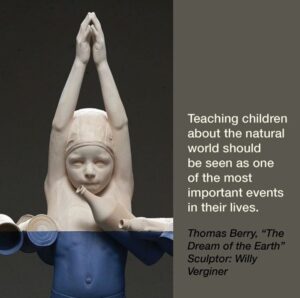
Science experiments can be challenging to find an alternative..
What is our WHY? What is the purpose for the use?
Do you feel like ‘teaching science’ and making a volcano in the sandpit because its ‘fun’?
(For children to want to do so daily because of the spectacle?)
OR
Are you teaching through imaginative story telling?
Perhaps you are looking at sharing a cultural story about your local volcanos (Ruepehu and his brothers)?
Is there an alternative? I’ve seen similar done using a small, controlled fire in the sandpit.
In the garden…
What about cutting herbs for cooking/kitchen play? Is there an alternative to using a food source? Yet still allows same processes for learning?
Consider growing a leafy, fast growing grass, wheatgrass ? grass is grass, we all know it grows fast.

Using grass avoids encouraging children to cut plants and flowers (needed for our eco system).
Grass is robust and plentiful.
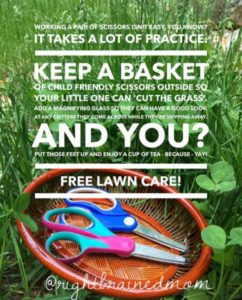
Perhaps you use dried, crispy, crunchy leaves?
Consider providing other natural resources for ‘cooking’ …. sand, mud/dirt, gumnuts, pine cones, 2nd hand clay, water, grass, recycled paper/cardboard, used tea bags.
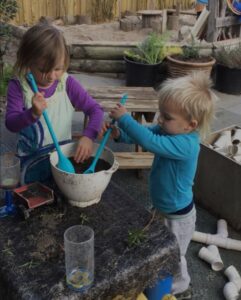
Reflect and review
When a controversial topic arises within your team or centre, here are some questions to consider…
What are our centre values and beliefs? What does our philosophy say?
How do we feel about it?
What does research suggest?
What do our families say?
Is this practice culturally and socially appropriate in our community?
Do we need to review our philosophy to align our practices??
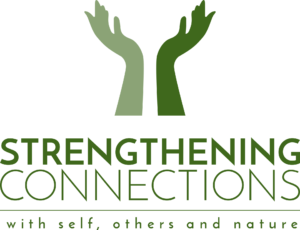
Ooh I love the grass cutting idea! Might have to grow some in a tray as our actual lawn doesn’t grow long at all here in Western Australia. Great article for reflection- I make play dough with the children and they enjoy the process- we should really make our own bread etc. to eat more often!
Good one! Great to read it fostered reflection. Baking is always a great learning experience, for well being, managing self, maths, literacy and science too!
Thank you for sharing.